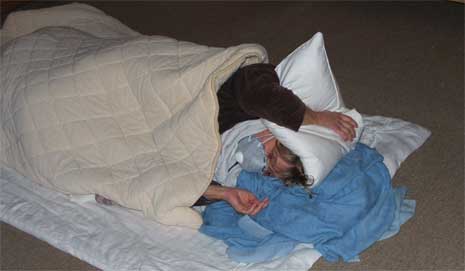Zurich targets first MCS Housing Project in Europe and issues an invitation to tender
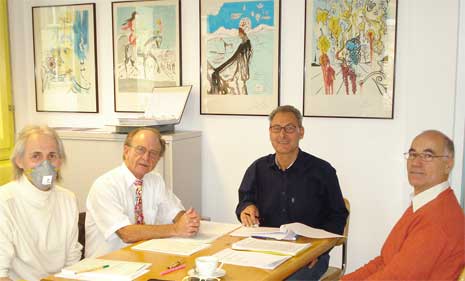
The Swiss city Zurich has tendered a MCS Housing Project. People with chemical sensitivity, commonly shortened as MCS (Multiple Chemical Sensitivity), will obtain a building biology home. Living in standard flats is nearly impossible. Substances from construction chemicals in concentrations tolerated by the healthy cause them unacceptable medical conditions. A toxic free habitation environment is required for stabilization and to be reasonably free from symptoms.
Currently such publicly supported projects for people with environmental illness exist only in the US and Japan. The City of Zurich is approaching this complex of problems with obligation and sympathy. They also hope to get innovative concepts for more public housing projects which could benefit many more people. The completion will require some time indeed, but the project looks promising because it is pro-actively supported by many professionals.
The search of a suitable estate for the project lasted months. The location for the house had to meet a set of criteria. Christian Schifferle, the President of the residential building cooperative HEALTHY HABITATION, went with specialists to inspect building sites again and again. Then it happened, the site was found. A dream came true for this very engaged Swiss. How the MCS Housing Project will come true.
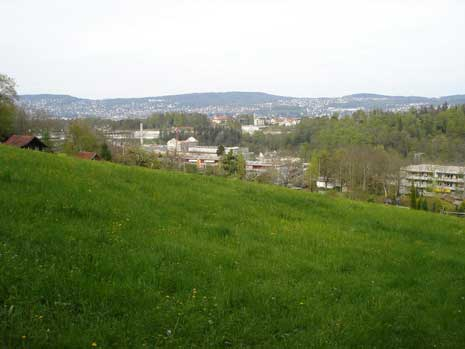
Beginning of November the City Zurich published a press release with detailed infos about the project. CSN sends its best wishes for success.
The estate authority of the City encourages habitation for severe cases of environmental illness. The construction of a new building at Rebenweg in Zurich-Leimbach was tendered according to a Swiss specific practice which allows to limit the selection to expert contenders. A path breaking project for an MCS compatible residential building with about ten or twelve small flats satisfying the highest building biology standards is expected. Teams of architects or planners had to file their bids by end of November to the building department. A panel will choose five teams from the applications received, who have to submit their drafts for the project by April 15, 2010. The decision will be made in May.
The City of Zurich assumes 5.000 cases of the severe illness MCS all over Switzerland. Often it’s impossible for them to find suitable habitation to live. Most minimal concentrations of chemicals trigger symptoms: vertigo, headache, limb aches, skin and respiration problems, chronic prostration. The one who is struck severely cannot work and finds himself increasingly separated from society, according to the City in its press release.
With this project of a pioneering building biology compatible house, the residential building cooperative HEALTHY HABITATION MCS, founded in 2008 based in Zurich, and the City of Zurich want to provide MCS suitable habitation and lebensraum. The site at the Rebenweg with its 1214 sq m has been evaluated thoroughly and most notably for Zurich conditions, the air quality is good.
Because the new residential building cooperative lacks adequate capital resources, the City is pre-financing the project competition with 150.000 Swiss Francs. The realization of the project is calculated with 5 million Francs. In order to achieve affordable rents, the coop aims to cover 1.5 million Francs by fund raising.
Interview Silvia K. Müller with Christian Schifferle
Christian Schifferle was interviewed by Silvia K. Mueller. He spoke of how the idea occurred to create a MCS housing project in Switzerland and which barriers yet to be overcome, but also what remarkable support it already has received.
Silvia K. Mueller: Christian, we all are very proud of you and enormous happy about the MCS housing project which getting into gear in Switzerland. How long did it take since you first had the idea for the project and what was your motivation?
 Christian Schifferle: As I have suffered from environmental illness since childhood, that’s nearly 50 years, I first asked the city government of Zurich about accommodation for MCS cases 20 years ago. So it required several attempts and much perseverance. I crew up with lacquer and thinner and obviously I was ill, but NOBODY around took me seriously and I was dealt with as a malingerer.
Christian Schifferle: As I have suffered from environmental illness since childhood, that’s nearly 50 years, I first asked the city government of Zurich about accommodation for MCS cases 20 years ago. So it required several attempts and much perseverance. I crew up with lacquer and thinner and obviously I was ill, but NOBODY around took me seriously and I was dealt with as a malingerer.
SKM: You suffered from the existence of an outsider, into which you were forced?
CS: Yes, because from the very beginning I fought a lonely battle to survive. Being excluded marked me and made my into a political MCS activist who thinks spiritual but knows that it will take real activity to get anything done. Actions speak louder than pretty words. The plight of others and the lack of solidarity really hit me. So I founded the Swiss MCS League nearly 10 years ago. It seems MCS is my fate and my life-task, because I had this disease from childhood on.
SKM: What do you think prepared the City of Zurich for this innovative project, which last but not least will be beneficial for other building projects? Healthy habitation is not only trendy but also results in healthy and more powerful human beings. Was this idea decisive too for the City of Zurich?
 CS: I started flyer campaigns in front of the Zurich City Hall and posted reports in noted local and countywide media. This made others affected by MCS to contact the authorities as well. Now the city takes us for serious and is interested to learn from our MCS housing project how to build healthier. So now we will offer this to the public media more often and I also think it is really great, what you do with CSN-Germany for us MCS sufferers. Even a foundation for MCS, which lies very close to my heart, turns out to be possible by the force of this housing project.
CS: I started flyer campaigns in front of the Zurich City Hall and posted reports in noted local and countywide media. This made others affected by MCS to contact the authorities as well. Now the city takes us for serious and is interested to learn from our MCS housing project how to build healthier. So now we will offer this to the public media more often and I also think it is really great, what you do with CSN-Germany for us MCS sufferers. Even a foundation for MCS, which lies very close to my heart, turns out to be possible by the force of this housing project.
SKM: How did you manage to make the guys from the City of Zurich listen to you and that now, actually it can be said this way, it looks like a dream to come true for MCS sufferers?
CS: Simply it was due to the long-time pressure by the media reports. That’s great, what the city of Zurich is doing now. Special thanks should go to them for this pioneer project. Fortunately times have changed. Today we preach to the choir about HEALTHY HABITATION. We, the environmentally diseased have to make use of it to set precedents. Healthy houses for EI’s are physical facts which help others for a better understanding of this environmental illness and which lead to acceptance.
SKM: Who were and who are the biggest supporters for your project?
CS: First there were these approximately 45 members of a cooperative who acquired one or several shares of about 330 Euro and more each by now. A total of nearly 20.000 Euros, with that we had a good start. We should mention the two doctors Dr. Roman Lietha and Dr. Klaus Tereh who supported us from the early beginnings and who both are on the executive committee.
SKM: For some months we have severe emergencies in Germany and we desperately seek shelters for MCS cases who have been hit hardest and can’t find accommodation to survive. Will you offer accommodation for emergencies?
CS: Yes, the housing shortage of others struck by environmental illness touches me dearly. Of course we intend to offer emergency housing. Surely you remember what I experienced, when I searched a site for my old caravan. I never will forget it, not even the numerous nights which I spend outside in the woods, sleeping outdoors on a canvas chair. Thus we intend emergency apartments for environmental diseased and a fragrance free common room where MCS sufferers can meet. The house rules will be strictly MCS adapted.
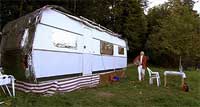 SKM: Christian we wish you that the MCS Housing Project will be built quickly and without trouble in order to end your nomadic caravan life. What will you do with your caravan in the mountains, when you finally receive a MCS compatible home?
SKM: Christian we wish you that the MCS Housing Project will be built quickly and without trouble in order to end your nomadic caravan life. What will you do with your caravan in the mountains, when you finally receive a MCS compatible home?
CS: As I am additionally sensitive to heat and suffer from the warmer temperatures in the lower regions, I will keep the caravan for the present. As many MCS cases are heat-sensitive, we also intend to provide MCS compatible emergency and holiday apartments in the mountains. Over the long term we aim to establish a system of holiday flats, because MCS diseased people hardly find suitable vacation homes. It would be nice to have such apartments at the seaside too. The Zurich MCS Housing Project obviously cannot ease all MCS accommodation needs but it should to be a pioneer impulse to originate many other MCS Housing Projects.
Author: Silvia K. Müller, CSN – Chemical Sensitivity Network, November 2009.
Translation: BrunO

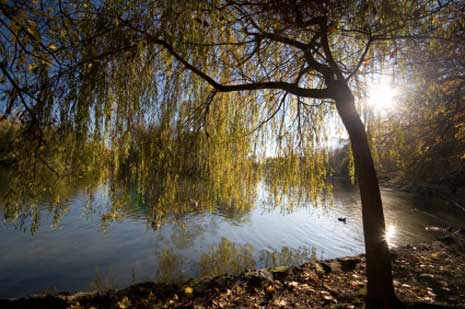
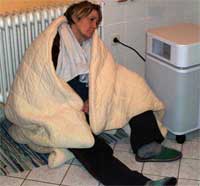 Pour qu’elle puisse entrer chez moi, elle a mis un jogging , un pull et des chaussettes de son mari qui n’avaient pas été lavés récemment.
Pour qu’elle puisse entrer chez moi, elle a mis un jogging , un pull et des chaussettes de son mari qui n’avaient pas été lavés récemment.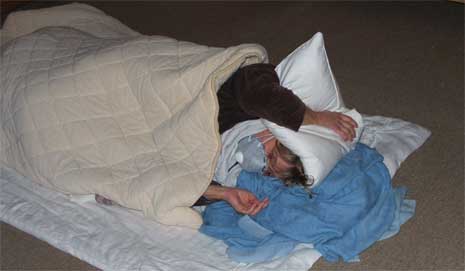
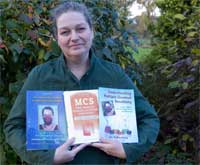 Els: “My goal is to bring more understanding and acceptance about this environmental illness and spread the knowledge as far and as much as possible. I hope young people, supplied with the facts, will not end up like me. Had I received this information 10 years ago, I would not have had to live the life of a recluse”.
Els: “My goal is to bring more understanding and acceptance about this environmental illness and spread the knowledge as far and as much as possible. I hope young people, supplied with the facts, will not end up like me. Had I received this information 10 years ago, I would not have had to live the life of a recluse”.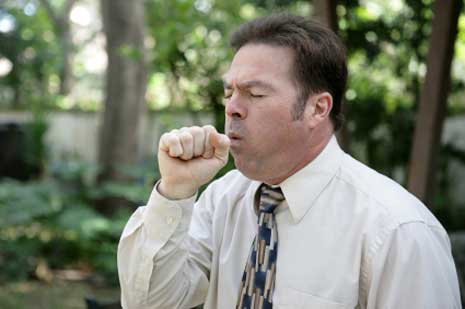
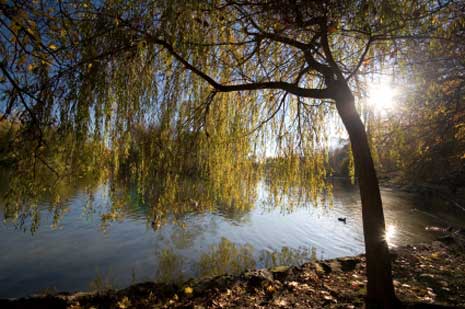
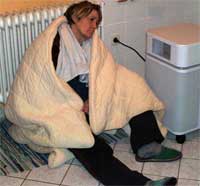 To let her into the house we had to shower her in the evening. I found old jogging pants of my husband’s and a cotton pullover; both had not been washed for a long time, and socks…
To let her into the house we had to shower her in the evening. I found old jogging pants of my husband’s and a cotton pullover; both had not been washed for a long time, and socks…